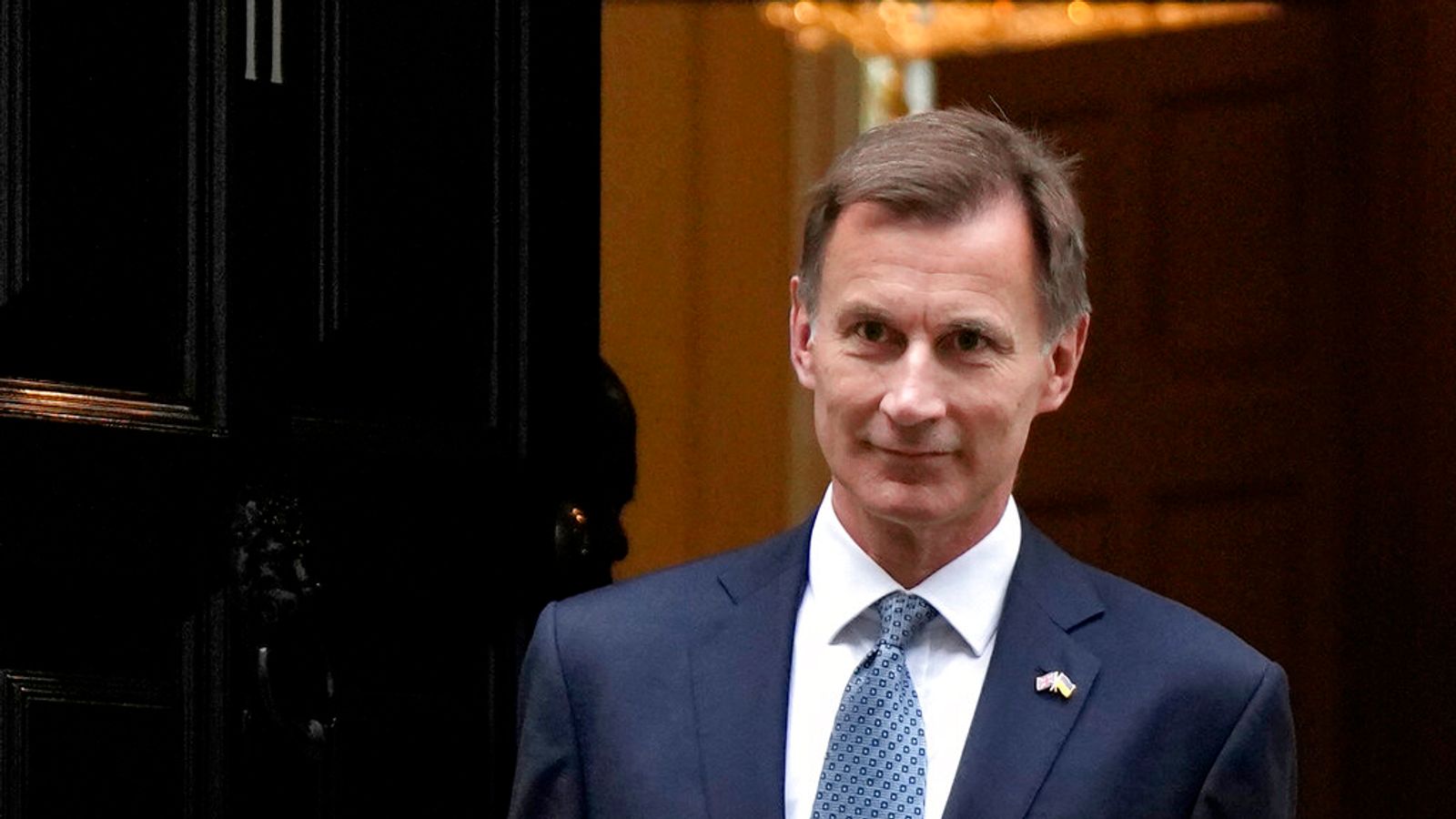Chancellor Jeremy Hunt has dismissed economic “gloom” in a major speech today as he promised to use “Brexit freedoms” to increase growth and productivity in the UK.
Speaking at Bloomberg’s European headquarters in London, he attacked “declinism”, instead saying the country was “poised to play a leading role in Europe and across the world in the growth sectors which will define this century”.
But his speech came against the backdrop of a cost of living crisis, ongoing strikes over pay, and demands from some of his party to focus on tax cuts to boost the economy.
On the latter, Mr Hunt ruled out any immediate action, saying the government would only cut taxes “when the time is right”.
Chancellor’s speech as it happens – politics latest
The former health and foreign secretary took over the Treasury under the turmoil of Liz Truss’s government, which saw her and her first chancellor, Kwasi Kwarteng, announce a raft of unfunded tax cuts, which saw the markets react badly.
As a result, his first speeches from Number 11 focused on the dire situation the country was left in, telling the public it was “likely to get worse before it gets better”.
But Mr Hunt appeared to echo some of the former prime minister’s optimistic language around growth that proved so popular with Conservative Party members, saying the government had a plan for “long-term prosperity based on British genius and British hard work”.
The chancellor added: “Declinism about Britain was wrong in the past – and it is wrong today. Some of the gloom is based on statistics that do not reflect the whole picture.
“Like every G7 country, our growth was slower in the years after the financial crisis than the years before it. But since 2010, the UK has grown faster than France, Japan and Italy. Since the Brexit referendum, we have grown at about the same rate as Germany.
“If we look further ahead, the case for declinism becomes weaker still. The UK is poised to play a leading role in Europe and across the world in the growth sectors which will define this century.”
However, Sky News’ business presenter, Ian King, warned the comparisons had been “very, very carefully selected… to paint the UK in a positive light”, adding: “Probably more pertinent is the fact that the UK economy is the only one in the G7… whose economy remains smaller than it was going into the pandemic.”
Read more:
Sunak fails to give Zahawi full vote of confidence
Boris Johnson earns nearly £1m a month, figures show
Braverman faces Windrush reform backlash
The speech comes two months ahead of Mr Hunt’s first full budget, and a number of Tory MPs are pushing for him to introduce tax cuts to bring down the historically high tax burden under the premiership of Rishi Sunak.
Former leader Sir Iain Duncan Smith told the Daily Express: “The government must make it very clear that we believe in lowering the tax, lowering costs, giving people greater choice.
“That always seems to me to be a positive message to send – rather than saying simply you can’t do tax cuts, that’s a negative.”
But Mr Hunt continued to resist such calls, with both him and Mr Sunak sticking to their guns that lowering record inflation is the key priority.
“The biggest, quickest tax cut that the prime minister and I can deliver for families up and down the country is to halve the inflation that is eating away at people’s pay,” he told the audience on Friday.
“It’s pushing up the price of the weekly shop and is something we can deliver quickly and will help everyone.”
The chancellor added: “We are committed… to a low tax economy and the difference between Conservatives and Labour is that we cut taxes when we can. They don’t.
“And that’s because we recognise that a low tax economy is one of the vital ingredients for dynamism, entrepreneurialism, to encourage people to take risks. And that’s why we want to do it when the time is right.”
‘Brexit freedoms’
Mr Hunt said instead, he would seek to exploit what he sees as the opportunities of Brexit in order to kickstart the economy.
“Confidence in the future starts with honesty about the present, and we should not shy away from the biggest challenge we face which is our poor productivity,” he said. “Our plan for long term prosperity tackles that challenge head on.
“It is a plan necessitated, energised and made possible by Brexit which will succeed if it becomes a catalyst for the bold choices we need to take.
“Our plan for growth is a plan built on the freedoms which Brexit provides. It is a plan to raise productivity. It is a plan to use the proceeds of growth to support our public services at home, to support businesses in the new low carbon economy and to support democracy abroad.
“It is the right course for our country and the role in the world to which we aspire.”
However, many experts believe Brexit has contributed to the UK’s struggling economy due to increased trade barriers with the EU.
Asked by Sky News’ Paul Kelso whether he would concede Brexit is “failing on its own terms for business and those terms need to be redressed”, Mr Hunt replied: “No.
“It’s a big change in our economic relations with our closest neighbours, and of course that is going to need adaptation, and of course there is some short term disruption, but I think it’s completely wrong to just focus on that without looking at the opportunities.”
Mr Hunt also used his speech to announce that the government is to proceed with reforms to so-called “Solvency II” – an EU directive that governs the amount of funds British insurers are required to hold in reserve.
The Treasury pointed to an estimate by the Association of British Insurers which suggested the changes could unlock up to £100bn of private investment into UK infrastructure and clean energy – such as nuclear power – over the coming decade.
‘Growth on the floor’
Labour’s shadow chancellor, Rachel Reeves agreed with Mr Hunt that the UK had “so much potential”, but claimed it was only her party’s plans that could seize it.
“Thirteen years of Tory economic failure have left living standards and growth on the floor, crashed our economy, and driven up mortgages and bills,” she said.
“The Tories have no plan for now, and no plan for the future. It’s time for a Labour government that will build a better Britain.”
The Liberal Democrats’ Treasury spokeswoman, Sarah Olney MP, claimed the chancellor “sounds like an unfaithful partner asking for yet another chance – but after crashing the economy and sending mortgages sky-high, why should we trust them again?”
She added: “Jeremy Hunt’s speech is cold comfort for families and pensioners facing unbearable price rises.
“This government’s economic record is nothing less than a shambles and the British public will see right through this desperate attempt by yet another Conservative chancellor to rewrite history.”

